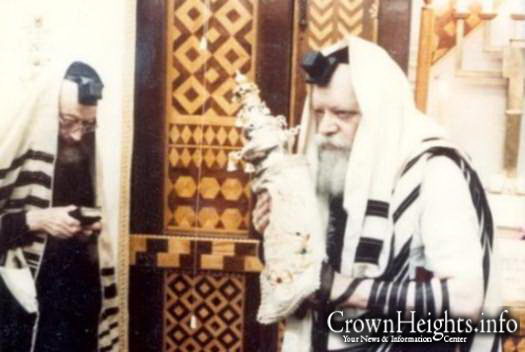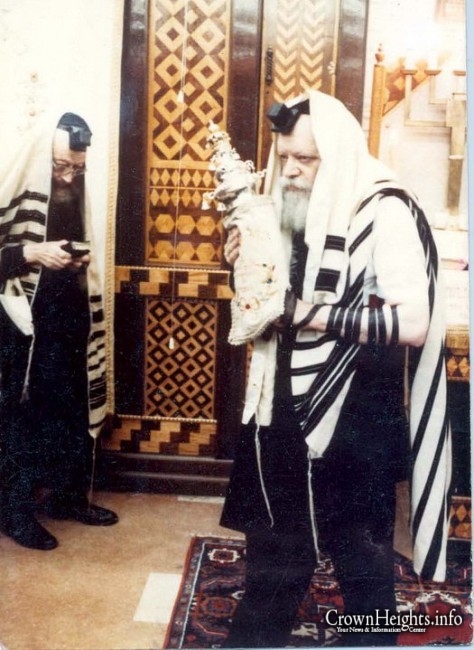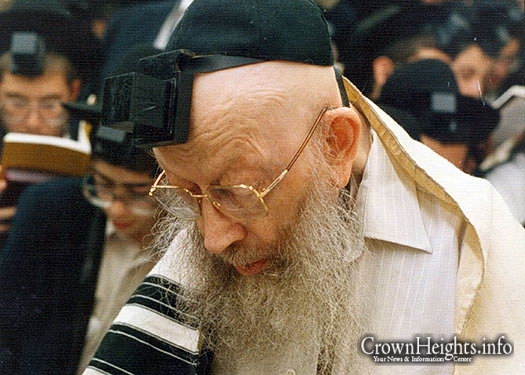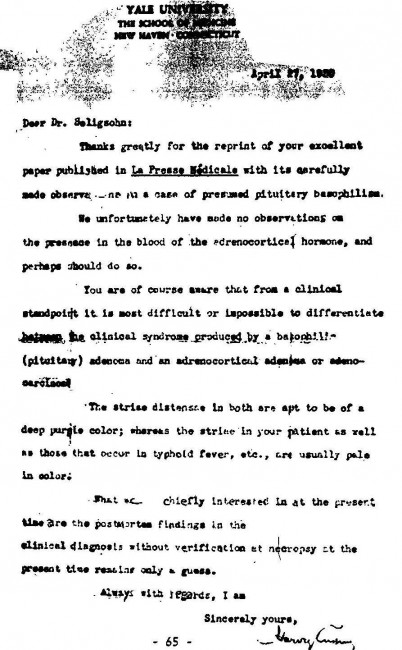
25 Shvat: 25th Yahrtzeit of the Rebbe’s Doctor
In honor of the 25th Yahrtzeit of the Rebbe’s personal physician, Dr. Avrohom Aba Seligson, we present a brief biography of his life and some of the fascinating and miraculous events that he had grown accustomed to witnessing over the years. The article was compiled by his son, Rabbi Michoel Aharon Seligson:
Dr. Avrohom Aba Seligson, whose 25th yahrtzeit fell out on the 25th of Shvat, was born in Krakow in 5667/1907. His father, Rabbi Michoel Aharon, was a fourth generation descendant of the Alter Rebbe, and had the merit to host the Frierdiker Rebbe in his home around the time that Reb Avrohom Aba was born.
A few years later Reb Michoel Aharon began a Chassidus class in his house on Shabbos at the expressed wish of the Frierdiker Rebbe. There were no Lubavitchers in the area, so Gerer and Belzer Chassidim would come and study Torah Or and Likutei Torah.
Medicine
Reb Avrohom Aba studied medicine in Vilna. In 1935, he achieved the title professor in medicine. Dr. Seligson moved to Vienna where he conducted pioneering research in endocrinology. In the U.S. his work was published in the American Medical Association Journal. He maintained a correspondence regarding his work with Dr. Harvey Cushing of Yale University, considered to be the father of modern neurosurgery, who took a great interest in Dr. Seligson’s findings. In Vienna, Dr. Seligson also had a Yechidus with the Frierdiker Rebbe on one of the Rebbe’s visits there.
Shanghai
Dr. Seligson was one of those fortunate to receive a transit visa from the noted Japanese vice- consul to Lithuania, Chiune Sugihara, who saved thousands of Jews. Upon reaching Shanghai, where Dr. Seligson spent the war years together with the Lubavitch Temimim and the students and faculties of the Litvishe Yeshivos; he was instrumental in saving many Jews from the diseases rampant in the Jewish ghetto.
The Frierdiker Rebbe’s Blessing
Arriving in the U.S. in 1947, Dr. Seligson received his medical license. He notified the Frierdiker Rebbe, and in response was sent a letter of blessings for success. The letter was signed ,מכבדו ומברכו one who honors him and blesses him. This was considered an unusual expression on the Frierdiker Rebbe’s part.
In the Frierdiker Rebbe’s last years Dr. Seligson was taken to see him on a routine basis, by the RaMaSh, the Rebbe’s son-in-law. Dr. Seligson was present when the Rebbe was nistalek. Thereafter, Dr. Seligson became the physician to the Rebbe’s household, treating Rebbetzin Chana, as well as Rebbetzin Nechioma Dina, Rebbetzin Chaya Mushka and the Rebbe himself.
Prior to his wedding, Reb Avrohom Aba asked the Rebbe if he should add to his Torah study. To marry a kohen’s daughter, one needed to be a talmid chochom and to fulfill this requirement chassanim were told to commit a tractate of gemoro to memory. The Rebbe told Dr. Seligson that he did not need to be concerned about this.
He would be considered a Gaon
Rabbi Shusterman of Chicago related that when one of the important Rabbis of Chicago asked the Rebbe about Dr. Seligson, the Rebbe commented, “If Dr. Seligson had been by the Misnagdim, he would be considered a Gaon.”
In 1954 over the course of the winter months, Dr. Seligson spent every Friday night in the Rebbe’s room. For approximately an hour and a half, he discussed specific patients and medical issues with the Rebbe. This took place in the 1960’s and the early 1970’s as well.
Dr. Seligson would dedicate many hours of the night to Torah study. The Rebbe said that he was a Hatzna leches. Because of his modesty, and that he discussed Torah matters with very few, most people had no idea that he had such a vast knowledge of Torah. He wrote comments on the Tanya, Chumash and Gemoro in the margins of his seforim, and made note of the sources of every Torah quote in Tanya. When the Rebbe saw Dr. Seligson’s Tanya with the handwritten notes, he asked for it and it is now located in the Aguch library.
One of the greatest doctors in our times
In a private Yechidus with one of Anash the Rebbe said about Dr. Seligson, “He is one of the greatest doctors in our times.”
When an individual once asked the Rebbe to whom he should turn with a medical problem, the Rebbe pointed to Rabbi Seligson saying, “If there is someone who preoccupied his G-dly soul with the Shulchan Aruch and his natural soul with medicine, what more do we need?”
I need you to cooperate with me
In a different case, the Rebbe directed the daughter of a Chossid to take her father to Dr. Seligson. When the Chossid’s condition improved the Rebbe said, “You see, I sent you to the correct doctor”.
At a subsequent Farbrengen, the Rebbe gave a piece of cake to the son of the aforementioned Chossid. He then got up from his chair and approached Dr. Seligson and gave him some wine and a piece of cake saying, “Just as our sages say that when the Kohanim eat of the offering, the owner of the offering is forgiven, in the same way you should eat the cake and the sick person will recover.”
The Rebbe told Dr. Seligson, “You should know that you are a great doctor. . .when doctors disagree with me, you should side with me and I will have a medical psak”.
As per Dr. Seligson’s advice
In another incident, the family of a woman who suffered from heart problems wrote on her behalf to the Rebbe asking for advice and a brocho. The Rebbe advised them to consult with Rabbi Dovid Twersky who would refer people to specialists. The top cardiologist to whom she was sent told the woman that she had six months to live unless she had surgery. The woman wrote to the Rebbe saying that she did not want surgery and again asked for the Rebbe’s advice and brocho. The Rebbe told her to consult Dr. Seligson.
When the family members approached Dr. Seligson, he asked them the precise wording of the Rebbe’s response, “Did the Rebbe say Rofeh Yedid (a doctor, a friend) or Dr. Seligson?” The family answered that the Rebbe had stated “Dr. Seligson”. Upon hearing this Dr. Seligson immediately gave his opinion, “There is no need for surgery”. Faced with two conflicting opinions, the family asked Dr. Seligson to discuss the matter with the cardiologist. He did not want to do so but the family was insistent. The conversation between them lasted about ten minutes. Dr. Seligson then told the family, “He has his opinion, and I have mine.” The family again wrote to the Rebbe. The Rebbe gave a brocho and the woman chose not to have surgery. Her passing eighteen years later was unrelated to cardiac issues.
You should issue the verdict that everything is OK and I will do the rest
A tale related in the name of the late Rabbi Leibel Raskin, the Shliach to Morocco occurred in late 1973. Rabbi Raskin’s son was seriously wounded during the preparations for Hakofos in 770 that year.
Rabbi Raskin laid his unconscious son down in a room and approached the Rebbe’s secretary, Rabbi Chodokov, asking for the Rebbe’s brocho. Rabbi Chodokov initially refused to disturb Rebbe, and only agreed when he heard how serious it was. The Rebbe instructed that Dr. Seligson should be alerted.
Dr. Seligson saw the boy and stated that he was fine. He then asked to see the Rebbe. When he left the Rebbe’s room he told the child’s father that the Rebbe had once told him, “If you as a doctor conclude that a case is beyond medical intervention, you should issue the verdict that everything is alright and I will do the rest.”
Expert in medicine
Dr. Seligson had a brilliant and an original mind and would come up with interesting solutions for his patients’ problems. Although he started out as a researcher, his goal was to practice medicine and help people. To that end, Dr. Seligson kept up with the latest developments in medicine. Pharmaceutical representatives would visit his office to introduce their newest products. On one occasion he told his son, “I will not rush into prescribing a new medication because it’s new. I need to verify all the details and the effects of this product before I suggest it to my patients.”
When patients visited him and were given instructions, Dr. Seligson did not forget about them after they left. Frequently, he would issue new instructions if he found a better or a simpler solution.
Dr. Seligson in his modesty charged very little for his services. A patient once did not respect Dr. Seligson‘s diagnosis because of the small bill, and arranged to visit another doctor in Manhattan. After being examined he was asked to wait. He could hear the doctor making a call in the next room. The physician began the conversation, “Dr. Seligson, I am interested in your opinion regarding this medical problem I encountered.” The patient paid a significant sum and learned a valuable lesson.
Patients would also visit doctors in Manhattan, but would not come back with a solution to their problem. When they visited Dr. Seligson, he immediately found the solution they needed.
A guest from France once came to the Rebbe for Tishrei. He had a skin irritation on his hand and the doctors were unable to help him. While in Crown Heights he visited Dr. Seligson who prescribed a cream that caused the irritation to completely disappear. When he returned to France he showed his hand to his physician, The physician’s response was, “Either he knows of a medication that we are not aware of or he performed a miracle”.
The Rebbe was treated by Dr. Seligson for forty years. Dr. Seligson would not discuss the Rebbe’s health with anyone. There were various issues over the many decades which the Rebbe asked Dr. Seligson to attend to. In late 1977 when the Rebbe suffered a heart attack, the Rebbe instructed the cardiologists attending him that they should brief Dr. Seligson and consult with him on the various matters that come up.
The Rebbetzin once said, “Where can I find a doctor like Dr. Seligson. When he hears my husband cough, he already prescribes a medication”.
Reb Avrohom Horofe by the Rebbe’im
Our Sages tell us (Tractate Shekalim chapter 5) that there were people who were responsible for certain daily functions in the Bais Hamikdosh. The Mishna gives the names of those who held these positions. The Rebbe asks (Likutei Sichos vol.22 pg. 147), how is it possible that for 420 years, over the course of many different generations, all the appointed people had the same name. The Rebbe explains that their name was actually their title and described their job.
Most of the Chabad Rebbe’im, beginning with the Alter Rebbe, were served by physicians called Reb Avrohom Horofe. The Alter Rebbe, the Mitteler Rebbe, the Rebbe Maharash had personal physicians called Reb Avrohom Horofe. For the last years prior to the Frierdiker Rebbe’s histalkus, and for the Rebbe it was Dr. Avrohom Seligson. He also treated members of the Crown Heights community, as well as patients in other neighborhoods.
Dr. Seligson was a medical expert who merited to be chosen by the Rebbe to be a channel for the Rebbe’s miracles to cure so many people.
As the years pass, Dr. Seligson is sorely missed. Yehi Zichro Boruch! May we merit the fulfillment of the prophecy, “The ones who are resting in the dust will awaken and rejoice” and Horav Hachossid Dr. Seligson among them.
















Anonymous
My wife had a medical problem and she asked the Rebbe at the women,s convention in 1967 what to do. The rebbe told her to go to ah groise doctor. she asked whether to go to Boston or New York. The rebbe said to go to a doctor in New York, My wife asked what groise doctor in New York . His answer was Doctor seligson.. he prescribed a medicene that she picked up at the corner of Nostrand and EasternParkway.. A small bottle which at that time cost 125.00 it was made of herbs and it worked.